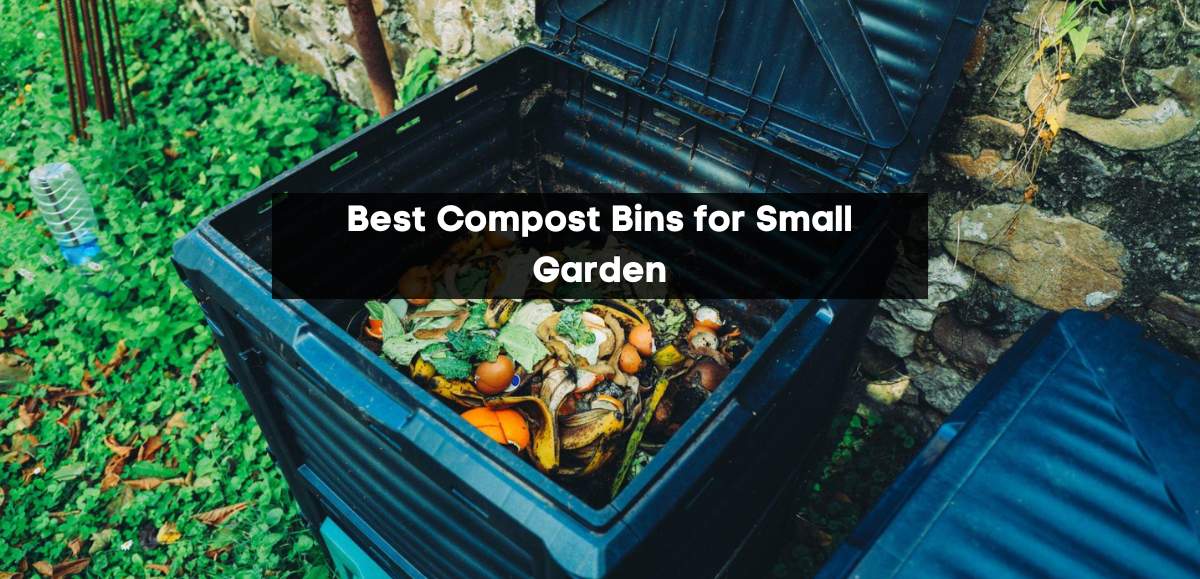Composting is a great way to reduce waste, improve garden soil, and save money. But if you have a small garden, you may wonder how to compost without taking up too much space.
The good news is that many compost bins are available for small gardens. In this article, we will discuss the best compost bins for small gardens and tips on choosing the proper compost bin for your needs.
So whether you’re a first-time composter or looking to upgrade your current compost bin, read on for all the information you need to get started!
What is Compost Bins?
A compost bin is a container used to collect and decompose organic materials, such as food scraps, yard waste, and paper products.
Compost bins are a great way to reduce waste, improve soil quality, and save money on fertilizer.
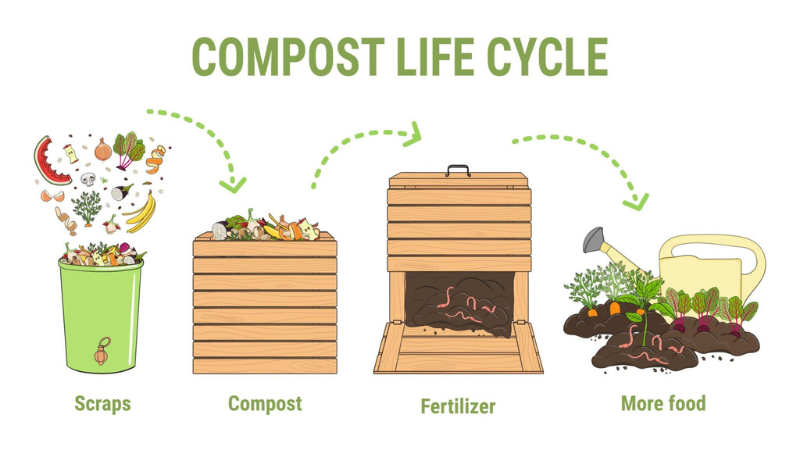
Best Compost Bins for Small Garden?
Many compost bins available in the market are suitable for small gardens. Here are some of the best compost bins for small gardens:
1. Blackdown Beehive Wooden Composter – 6 Tier
Compost bins can be an eyesore, but this clever option from Blackdown hides its function by masquerading as a beehive.
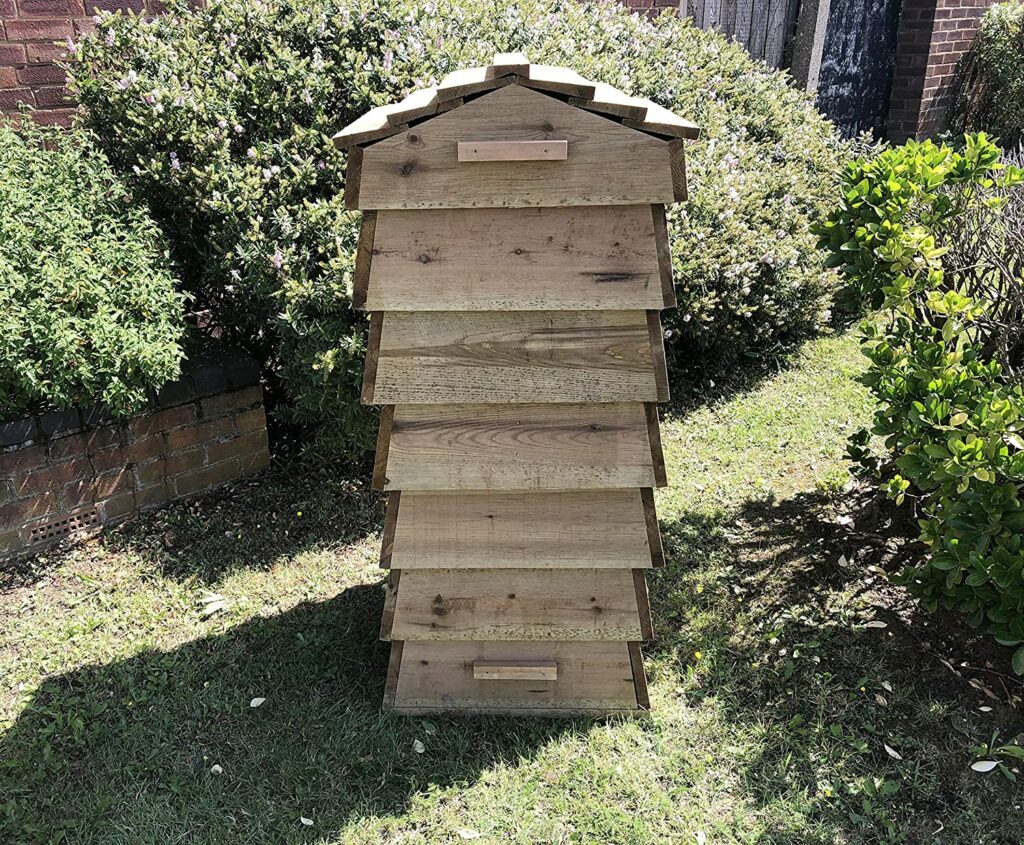
The Blackdown Beehive Composter is made from attractive British redwood timber, with each plank measuring 22mm thick. It’s also been pressure treated for a 15-year guarantee, so you can be sure it will last many years.
The roof of the composter attaches to the body with hinges and a sash cord, making it easy to open and close. This allows you to keep your hands free when adding waste to the composter and also provides easy access to your compost when it’s ready to use.
The Blackdown Beehive Composter is a great way to add a touch of style and functionality to your garden. It’s also a sustainable way to reduce waste and improve soil quality.
2. 315L CompoSphere Rollable Tumbler Composter
The CompoSphere Rollable Tumbler is a unique and innovative compost bin perfect for small gardens.
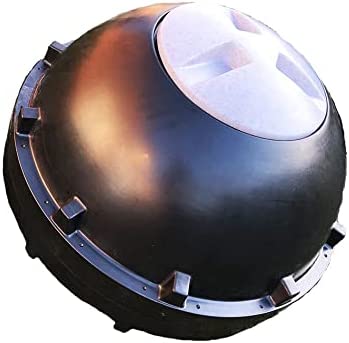
The CompoSphere is made from recycled, UV-protected plastic and has a capacity of 315L. It is also straightforward to use. Simply add your food scraps and yard waste to the bin, then turn it in regularly to help the compost break down.
The CompoSphere’s unique spherical design allows you to turn it quickly, even when it is complete. This helps speed up the composting process and ensures that your compost is high quality.
The CompoSphere is also very portable, making it easy to move around your garden. This is an excellent advantage if you have a small garden or want to compost in different areas of your yard.
3. Green Cone Waste Digester
The Green Cone is a stylish, innovative compost bin perfect for small gardens.
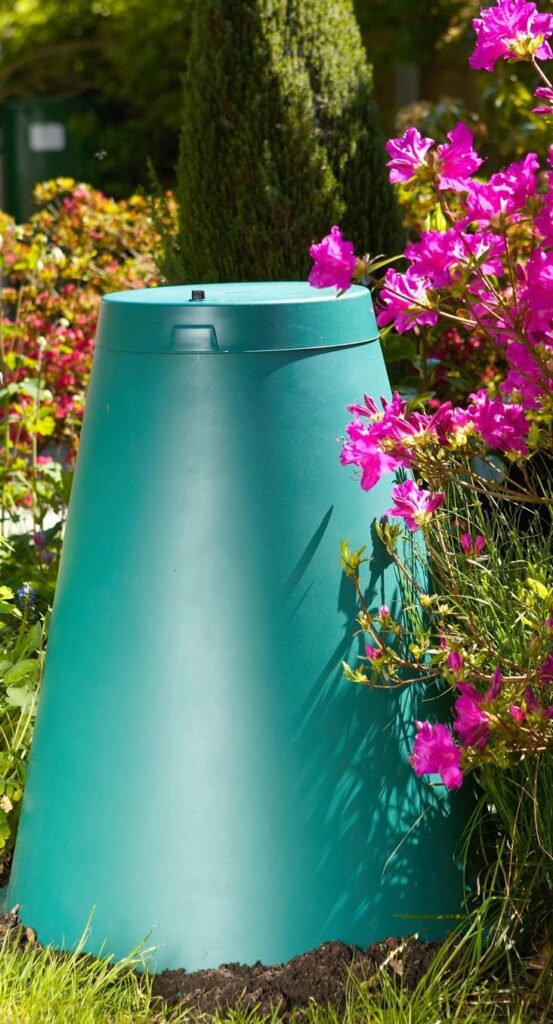
The Green Cone is made from durable plastic and has a sleek, modern design. It is also straightforward to use.
Simply add your food scraps and yard waste to the basket, and then bury the basket in the ground. The Green Cone’s unique design allows for aeration and drainage, which helps to speed up the composting process.
The Green Cone also has a kitchen food waste caddy and a sachet of composting accelerator powder. The caddy makes collecting food scraps from your kitchen easy, and the accelerator powder helps speed up the composting process.
4. VermiHut Plus 5-Tray Worm Compost Bin
The VermiHut Plus 5-Tray Worm Compost Bin is a great way to compost home food scraps and yard waste. It is made from durable materials and is designed to be easy to use. The bin has five trays, which provide plenty of space for worms to break down organic matter.
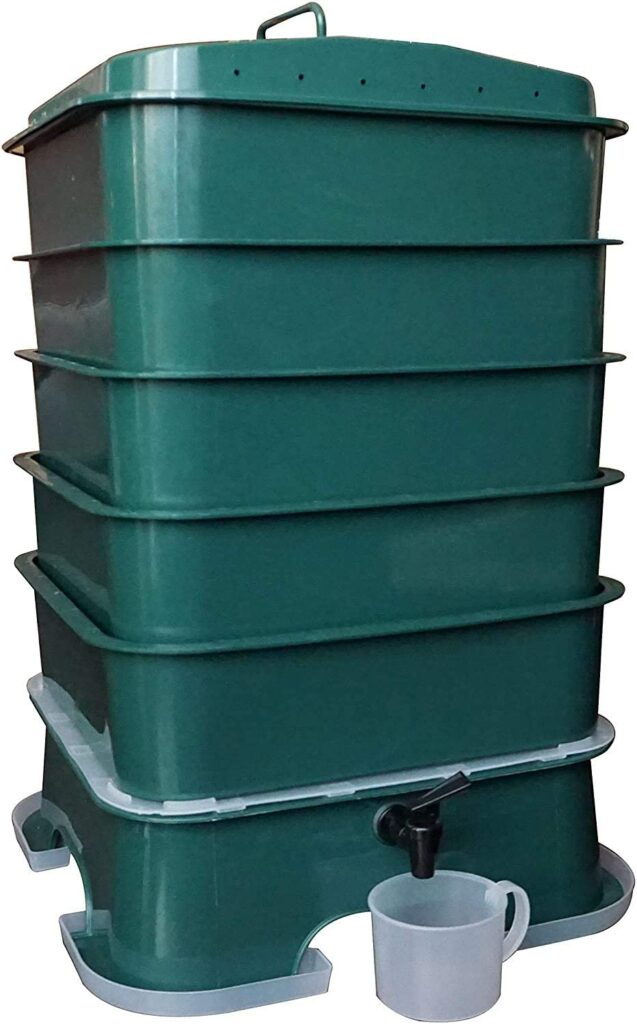
The worms will turn your food scraps and yard waste into nutrient-rich compost that you can use to fertilize your plants.
The VermiHut Plus 5-Tray Worm Compost Bin is a great way to reduce environmental impact. By composting your food scraps and yard waste, you can help to reduce the amount of waste that goes to landfills. You can also help improve your soil’s quality by adding compost to it.
5. Meridian Compost Tumbler
Tumbler compost bins are an excellent option for those who want to compost at home. They are easy to use and can be placed in various locations.
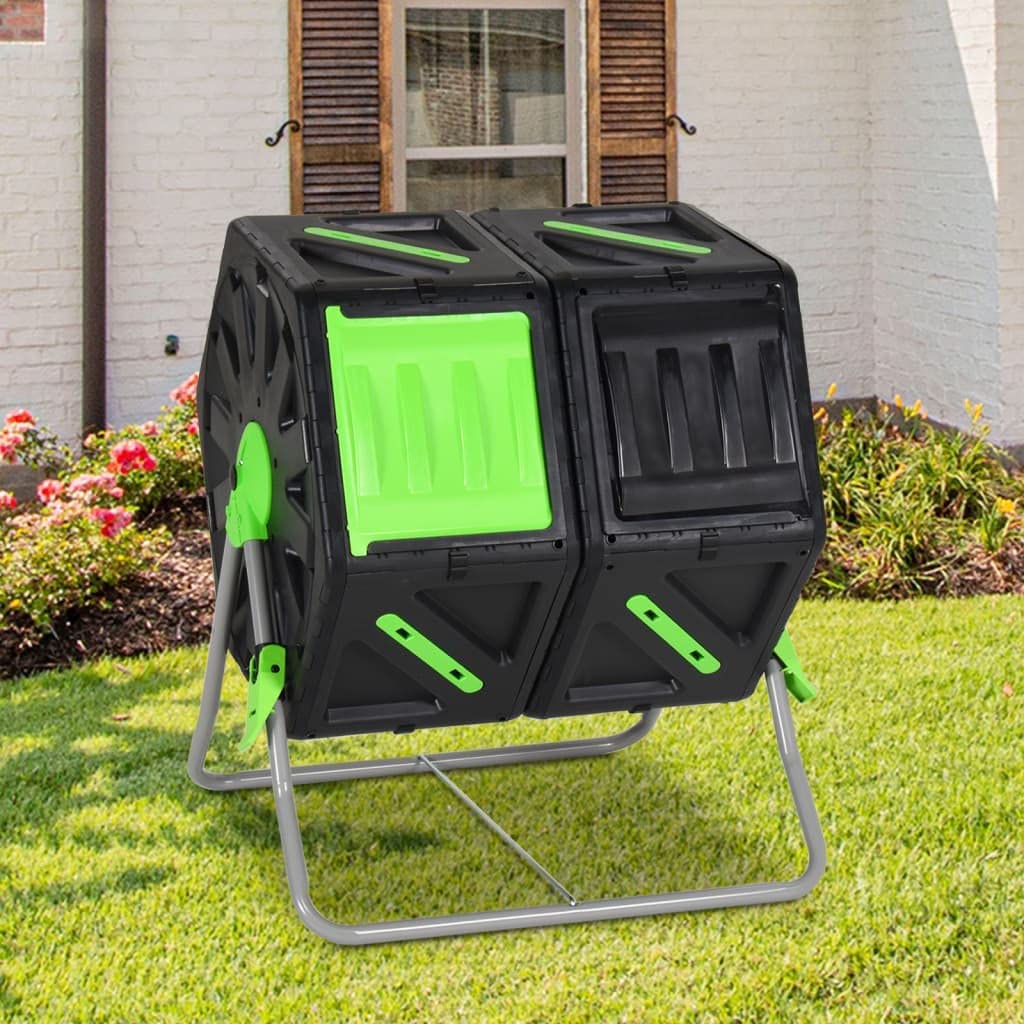
Tumbler compost bins also help to protect your compost from rodents and other pests.
Sol 72 Outdoor Tumbler compost bin is made of durable plastic and has two separate compartments.
This allows you to compost different types of materials at the same time. The bin also has a ventilation system that helps to keep the compost aerobic and prevents it from becoming anaerobic.
To use a Tumbler compost bin, add your food scraps, yard waste, and other organic materials. Then, turn the bin regularly to help the compost break down. Once the compost is finished, you can remove it from the bin and use it to fertilize your plants.
Types of Compost Bins
There are many different types of compost bins available on the market. Some of the most popular styles include:
In this article, we will explore the most common types of compost bins and their benefits.
Tumbler Compost Bins:
Tumbler compost bins are designed with a rotating drum or barrel that allows for easy mixing and aeration of the compost materials.
This design facilitates faster decomposition and reduces the effort required to turn the compost manually.
Tumbler bins are perfect for those with limited space or physical limitations, requiring less bending and lifting.
Worm Compost Bins (Vermicomposting):
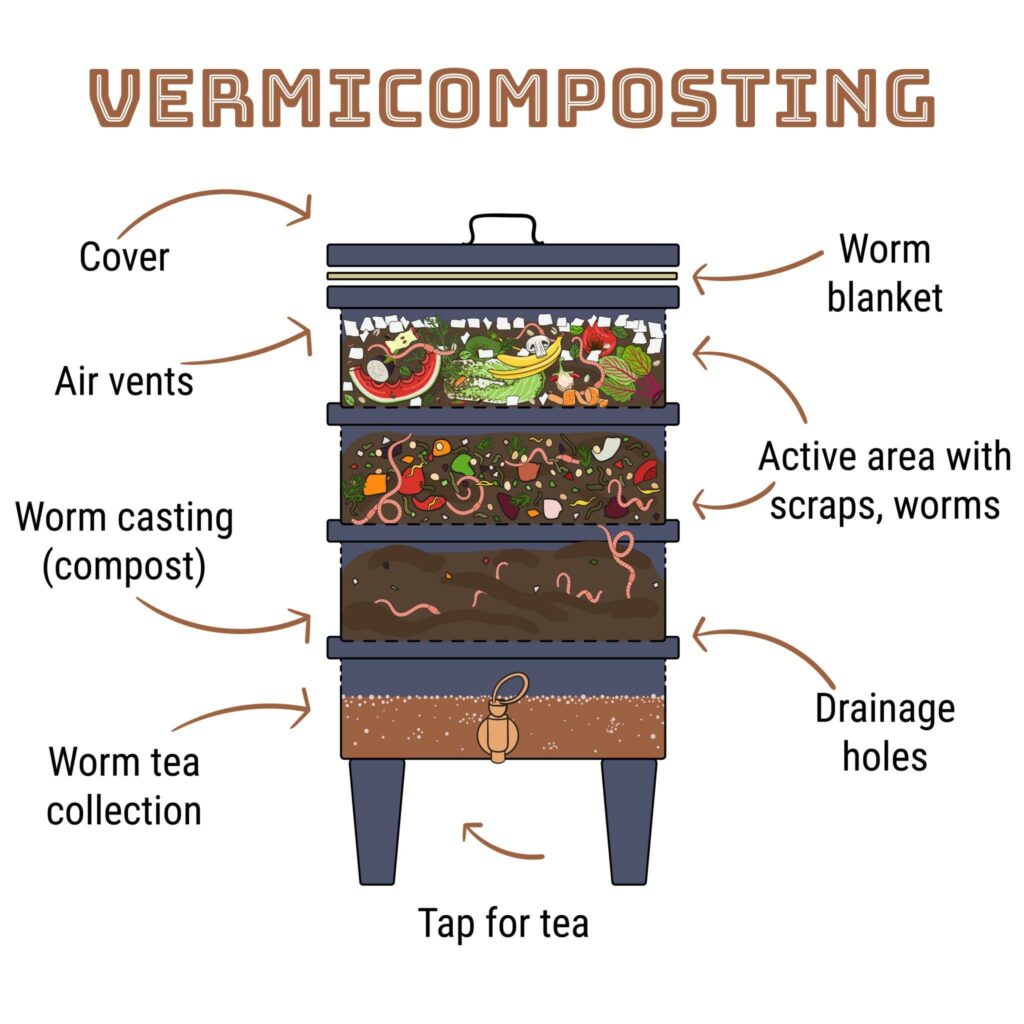
Worm compost bins utilize the power of earthworms to break down organic waste. These bins create an ideal environment for worms to thrive and convert kitchen scraps, coffee grounds, and other organic materials into nutrient-rich castings.
Worm composting is an excellent choice for indoor or small-scale composting, as it doesn’t produce odors or attract pests when managed correctly.
Stationary Compost Bins:
Stationary compost bins are simple and cost-effective. These bins can be made from various materials such as wood, plastic, or wire mesh.
They provide an open-bottomed container that allows for proper airflow and drainage. Stationary bins are suitable for larger yards or gardens where space is not a constraint.
Compost Tumblers:
Compost tumblers are similar to tumbler compost bins but are usually smaller and can be turned manually.
These bins are popular among gardeners who desire more control over composting. Compost tumblers require regular turning to ensure proper aeration and decomposition.
Compost Piles:
Compost piles are the most basic and natural form of composting. They involve creating a mound or heap of organic materials in a designated area.
While it requires no investment in bins or containers, managing a compost pile may require more effort in regular turning and maintenance.
Compost piles are well-suited for more significant properties or agricultural settings.
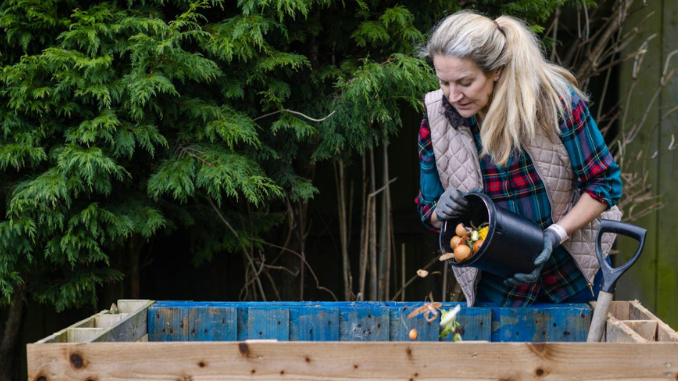
How to Choose the Best Compost Bin for Your Garden
Choosing the best compost bin for your garden is an important decision that can significantly impact the success of your composting efforts.
With various options available, it’s essential to consider a few key factors to ensure you make the right choice.
This guide will walk you through selecting the ideal compost bin in simple and easy-to-understand language.
Size and Capacity:
Start by assessing the available space in your garden and the amount of organic waste you generate. If you have a small garden or limited space, a compact compost bin or worm composting system may be suitable.
On the other hand, if you have a large garden or generate a significant amount of waste, you may opt for a larger stationary bin or compost tumbler.
Type of Composting:
Consider the composting method that aligns with your needs and lifestyle. If you prefer a hands-on approach and want faster results, a tumbler compost bin that allows easy mixing and aeration could be a good fit.
If you choose a low-maintenance option or have limited outdoor space, a worm compost bin (vermicomposting) that utilizes worms to break down organic waste could be ideal.
Material and Durability:
Look for compost bins made from sturdy and durable materials such as recycled plastic or galvanized metal.
These materials are weather-resistant and can withstand outdoor conditions. Avoid containers that may deteriorate quickly or are prone to cracking or rusting.
Airflow and Drainage:
Proper airflow and drainage are crucial for successful composting. Choose a compost bin that provides adequate ventilation to facilitate decomposition and prevent foul odors.
Additionally, ensure the container has drainage holes or a bottom design that allows excess moisture to escape.
Pest and Odor Control:
Consider features that help keep pests and odors at bay. Some compost bins come with tightly sealed lids or pest-proof designs to prevent animals from accessing your compost.
Odor control features, such as aeration systems or carbon filters, can also help minimize unpleasant smells.
Ease of Use and Maintenance:
Look for a user-friendly compost bin that is easy to maintain. Features like access doors or removable panels make adding or removing compost materials convenient.
Consider whether the container requires manual turning or has a tumbling mechanism for effortless mixing.
Choose a container that suits your physical capabilities and the time available for maintenance tasks.
Aesthetic Appeal:
While not essential for composting success, the visual appeal of your compost bin can be important for some gardeners.
If aesthetics matter to you, select a container that complements your garden’s style and blends well with the surroundings.
How to Use a Compost Bin
Once you’ve chosen a compost bin, it’s time to start using it. Here are a few tips:
- Add a variety of materials to your compost bin, including food scraps, yard waste, and paper products.
- Keep your compost bin moist but not soggy.
- Turn your compost regularly to help it break down.
- Be patient! It can take several months for compost to be ready to use.
Benefits of Composting
Composting has many benefits, including:
- It reduces waste.
- It improves soil quality.
- It saves money on fertilizer.
- It helps to create a more sustainable garden.
Conclusion
In conclusion, choose compact tumbler bins, worm compost bins, or stackable bins for the best composting in small gardens. Consider size, functionality, and ease of use. Start composting in your small garden and enjoy nutrient-rich soil. Go green and sustainable!
FAQ
Q: What are the best compost bins for small gardens?
A: Some of the best compost bins for small gardens include compact tumblers, worm compost, and stackable compost bins.
Q: Which compost bin is most suitable for limited space in a small garden?
A: For limited space in a small garden, a compact tumbler compost bin or a worm compost bin (vermicomposting) would be ideal.
Q: Are there compost bins specifically designed for small gardens?
A: Yes, there are compost bins specifically designed for small gardens. Look for compact or space-saving models that are easily managed in limited areas.
Q: Can I use a compost tumbler in a small garden?
A: Yes, a compost tumbler can be used in a small garden. Compact tumbler compost bins are available that require less space and are suitable for smaller outdoor areas.
Q: Are compost bins suitable for indoor use in small apartments or balconies?
A: Yes, compost bins are suitable for indoor use in small apartments or balconies. Worm compost bins are a popular choice for indoor composting as they are compact, odor-free, and don’t require much space.
Q: How much compost can I expect to produce with a small garden compost bin?
A: The amount of compost you can produce with a small garden compost bin depends on capacity and composting habits. However, even a small bin can yield significant nutrient-rich compost over time.
Q: Can I use a compost bin in a small garden without causing odors or attracting pests?
A: Yes, it is possible to use a compost bin in a small garden without causing odors or attracting pests. Choose a compost bin with proper ventilation and consider adding carbon-rich materials like leaves or shredded paper to help control odors. Proper maintenance and avoiding meat or dairy products can also help prevent pest issues.
Q: How often should I turn the compost in a small garden bin?
A: In a small garden compost bin, it is recommended to turn the compost every few weeks to promote aeration and even decomposition. However, this may vary depending on the type of compost bin and the composting method you use.
Q: Can I purchase a compost bin for a small garden online?
A: Yes, you can find a variety of compost bins suitable for small gardens available for purchase online. Many reputable gardening stores and online marketplaces offer a wide selection.
Q: Are there any budget-friendly options for compost bins in small gardens?
A: Yes, there are budget-friendly options for compost bins in small gardens. Simple stationary bins made from wire mesh or wooden pallets can be cost-effective for small-scale composting.

